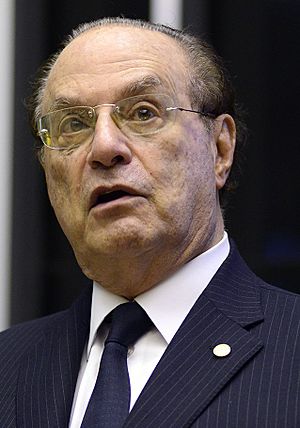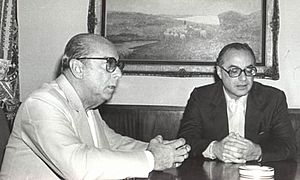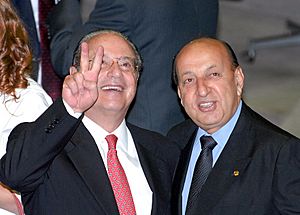Paulo Maluf facts for kids
Quick facts for kids
Paulo Maluf
|
|
|---|---|

Maluf in 2015
|
|
| Federal Deputy for São Paulo | |
| In office 1 February 2007 – 22 August 2018 |
|
| In office 1 February 1983 – 1 February 1987 |
|
| Mayor of São Paulo | |
| In office 1 January 1993 – 1 January 1997 |
|
| Vice Mayor | Sólon Borges dos Reis |
| Preceded by | Luiza Erundina |
| Succeeded by | Celso Pitta |
| In office 8 April 1969 – 8 April 1971 |
|
| Nominated by | Abreu Sodré |
| Preceded by | José Vicente Faria Lima |
| Succeeded by | Figueiredo Ferraz |
| Governor of São Paulo | |
| In office 15 March 1979 – 14 May 1982 |
|
| Vice Governor | José Maria Marin |
| Preceded by | Paulo Egydio Martins |
| Succeeded by | José Maria Marin |
| President of the São Paulo Comercial Junta | |
| In office 31 March 1976 – 14 March 1979 |
|
| Preceded by | Boaventura Farina |
| Succeeded by | Mário Jorge Germanos |
| President of the Federal Savings Bank | |
| In office 13 May 1967 – 7 April 1969 |
|
| Appointed by | Artur da Costa e Silva |
| Preceded by | Lélio Pizza |
| Succeeded by | Reinaldo de Barros |
| Personal details | |
| Born | 3 September 1931 São Paulo, São Paulo, Brazil |
| Political party | PP (1995–present) |
| Other political affiliations |
|
| Spouse |
Sylvia Lutfalla
(m. 1955) |
| Children | 4 |
| Parents |
|
| Alma mater | University of São Paulo (B.E.) |
| Occupation | Civil engineer |
| Signature | |
Paulo Salim Maluf (born 3 September 1931) is a Brazilian politician. He has had a long career, serving for over four decades in various important roles. These roles include being the State Governor of São Paulo, the Mayor of the City of São Paulo, and a Congressman. He also ran for President.
Maluf's political approach often focused on populism, which means he tried to appeal directly to ordinary people. He was also known for starting many large public works projects. Throughout his career, he faced many claims about how he managed public money. In 2017, a Brazilian court made a decision about some of these claims. He was later placed under house arrest because of his age and health.
He leads the local branch of the right-wing Progressive Party of Brazil (PP) in São Paulo. This party is connected to an older party called the National Renewal Alliance (ARENA). Maluf has also faced legal requests from other countries, which means he could be arrested if he travels outside Brazil.
Contents
Early Life and Career Beginnings
Paulo Salim Maluf was born in São Paulo. His parents, Salim Farah Maluf and Maria Stephan Maluf, were Christian immigrants from Lebanon. In 1954, he finished his engineering degree at the University of São Paulo (USP). A notable classmate of his was Mário Covas, who later became a major political rival.
Maluf started his political career thanks to his family's friendship with the military president at the time, Artur da Costa e Silva. In 1969, he was chosen to be the mayor of São Paulo. During his time as mayor, he paused the building of the São Paulo Metro. Instead, he focused on building a large elevated highway called the Minhocão (meaning "Big Earthworm").
This highway was very controversial. Many people believe it caused problems for the downtown area of São Paulo. It placed a busy road in the middle of homes, showing a focus on cars and roads during the military dictatorship.
Running for President

After being mayor, Maluf became the secretary of transport for São Paulo state in 1972. He then became the official candidate for governor of São Paulo in 1978 and was elected.
As governor (1979–1983), Maluf used his position to promote himself for the 1985 presidential elections. He did this by donating ambulances to poorer towns and giving awards to important people. He also spent a lot on public works, including some projects that were questioned. One example was a plan to move the state's capital city, which did not succeed.
A major concern about his spending involved an oil company called Paulipetro. This company was started by Maluf when he was governor. It spent about US$500 million looking for oil but found mostly natural gas and water. By this time, Maluf was known for his political style, which some called "machine politics."
In 1982, he was elected as a federal deputy, receiving a record number of votes. He was seen as the military's preferred candidate for the 1985 presidential elections. However, his approach caused many leaders in his party, the PDS, to leave and form a new party. This led to the election of the opposition candidate, Tancredo Neves.
After the Dictatorship
After the military dictatorship ended, Maluf was elected to an executive position only once more, as mayor of São Paulo in 1992. He ran in almost every election for governor and mayor in São Paulo state and city. In 1989, he ran for president in the first direct presidential elections since 1960.
Despite facing many questions about his deals and his past connections to the authoritarian government, Maluf remained a strong political figure in São Paulo. When his last term as mayor ended in 1996, he had a very high approval rating of 80%. A 2011 survey even showed that many people in São Paulo still considered him one of the best mayors the city had ever had.
This continued support shows how Maluf was able to stay popular in Brazilian politics. Some experts believe his popularity came from his strong, traditional views, especially among small business owners. They say he often suggested tough solutions to social problems.
Later Life and Legal Challenges
After Celso Pitta's time as mayor of São Paulo, which followed Maluf's term, the city faced a lot of debt. This brought more attention to how Maluf and his former colleague had managed the city's money. People started looking closely at Maluf's public works projects, especially the expansion of concrete structures in the city.
One example of a project that raised concerns was the Ayrton Senna tunnel. This tunnel, which goes under Ibirapuera Park, was said to have cost much more per kilometer than the Channel Tunnel. There were claims that it cost over US$400 million more than it should have. Maluf's personal wealth also became a topic of discussion. While critics linked it to his involvement in various issues, his supporters said it came from his family's businesses, like the large plywood company Eucatex.
Maluf was also part of a large investigation in 2003 about money held in bank accounts by him and his family in Jersey. He faced several legal decisions regarding his actions. In 2001, a final decision required him to pay about R$500 thousand to the government. Many of the claims against him could not be fully pursued due to Brazilian laws about how long a case can be investigated.
In September 2005, Paulo Maluf and his son Flávio Maluf were briefly held by the Brazilian Federal Police. This was related to an investigation where they were accused of trying to influence witnesses. They were released after a few weeks. Maluf's reputation was so well-known that in Brazil, a new verb, malufar, was created. It means "to take public money." This term has even been used in other countries.
In the 2006 elections, Maluf was elected to the Brazilian Chamber of Deputies with a very high number of votes. He was reelected in 2010. His 2010 election faced legal questions because of a new law called Lei Ficha Limpa (Clean Record Act). This law could prevent people found guilty by higher courts from running for office. However, Brazil's highest court decided that this law did not apply to the 2010 elections. This meant all challenges against Maluf's election were dropped. In the 2014 elections, his candidacy was initially denied, but he was allowed to campaign.
In 2007, a prosecutor in New York issued a legal document against Paulo Maluf. This document was related to claims that money was taken from a Brazilian road project. The money was said to have passed through a bank account secretly controlled by Maluf. A New York judge upheld this document in 2012.
The judge also refused to remove Maluf and his son from an Interpol Red Notice. This notice means they could be arrested and sent to other countries if they travel outside Brazil. However, this arrest warrant is not valid in Brazil because the Brazilian Constitution does not allow its citizens to be sent to other countries for trial.
In 2016, Maluf and his son Flávio were sentenced in France. On 20 December 2017, after a Brazilian court made a final decision, Maluf began a prison sentence. However, on 30 March 2018, he was released and placed under house arrest due to his age and health. He remains under house arrest. In August 2018, the Chamber of Deputies officially stated that Maluf had lost his seat as a Federal Deputy because of the court's decision.
See also
 In Spanish: Paulo Maluf para niños
In Spanish: Paulo Maluf para niños


